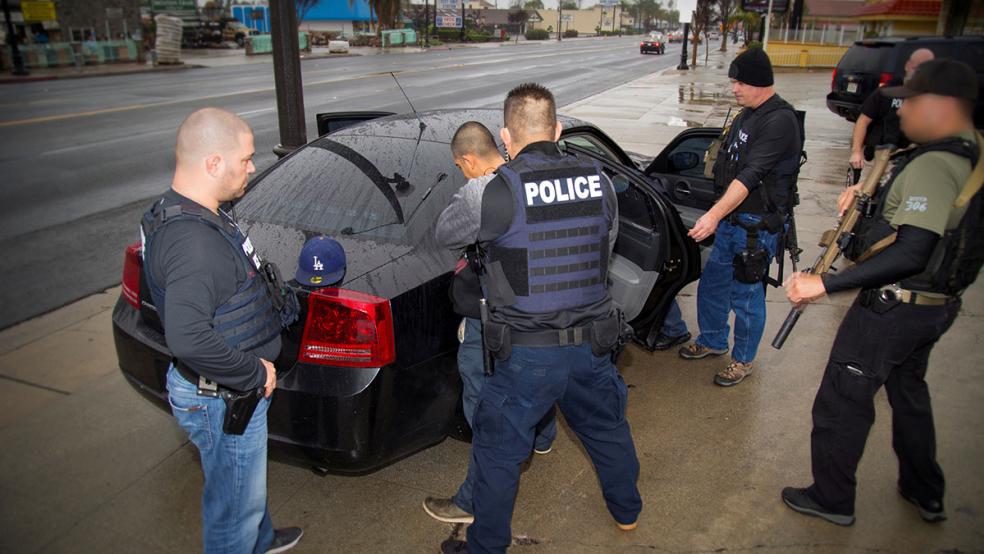President Trump has long criticized cities and counties that refuse to cooperate with federal immigration authorities in detaining illegal immigrants for possible deportation.
In January, in a retaliatory move against cities including New York, Chicago, Los Angeles and San Francisco, Trump ordered cuts in potentially billions of dollars’ worth of Department of Justice, Homeland Security and other federal grants to those communities.
Related: Trump Cracks Down on Sanctuary Cities – and It Could Cost Them Billions
On Monday, the Trump administration turned up the heat with the release of a report listing law enforcement agencies and jurisdictions that have refused to detain jailed immigrants for U.S. Immigration and Customs Enforcement. The report will be released weekly, as required by President Trump’s executive order signed January 25, “Enhancing Public Safety in the Interior of the United States.”
ICE routinely places detainers on illegal immigrants who have been arrested on local criminal charges when there is probable cause for their deportation. During the first reporting period of Jan. 28 through Feb. 3, ICE issued 3,083 detainers to local authorities across the country, according to the report.
Among the non-cooperative jurisdictions were Clark County in the Las Vegas area, Nassau County outside of New York City, Cook County in the Chicago area, Montgomery County in Iowa and Snohomish County in Washington state. ICE provided the following list of the highest volume of detainers issued to non-cooperative jurisdictions between January 28, 2017 and February 3, 2017:

Source: U.S. Immigration and Custom Enforcement
The final status of those detainers is not yet known. The list simply shows the largest number of detainers that were issued in the most recent reporting period in jurisdictions that have failed to cooperate with ICE in the past.
Overall, 206 people nationwide were allowed to leave jail instead of being held for ICE. Of that total, 142 illegal immigrants -- or 69 percent of the total -- were from Travis County, Texas. The county adopted a policy on Feb. 1 that greatly restricted its cooperation with ICE agents in rounding up illegal immigrants.
Related: Could Trump’s Attack on Sanctuary Cities Trigger a Tax Revolt?
Maj. Wes Priddy of the Travis County Sheriff’s Office in Austin told The Washington Post that his office does detain criminals convicted of serious crimes for immigration officials but does not as a rule turn over people awaiting trial. According to the DHS list, charges pending against many of those who had been released ranged from burglary and marijuana possession to vehicle theft, sex offenses against minors and kidnapping.
Trump has said that his tough immigration policies, which have reportedly triggered panic in Hispanic communities across the country, are largely targeted at detaining and deporting hardened criminals and gang members.
On Monday, Republican Texas Gov. Greg Abbott issued a statement denouncing Travis County law enforcement officials over the findings of the DHS report. “Today’s report from DHS is deeply disturbing and highlights the urgent need for a statewide sanctuary city ban in Texas,” he said. “The Travis County Sheriff’s decision to deny ICE detainer requests and release back into our communities criminals charged with heinous crimes ... is dangerous and should be criminal in itself.”
Related: Some Sanctuary City Officials Will Stonewall Trump Over Deportations
Some state and local officials, civils rights groups and immigrant advocacy organizations sharply criticized the release of the DHS report as a heavy-handed effort to intimidate law enforcement organizations and undermine undocumented aliens’ constitutional rights.
Cody Wofsy, a staff attorney with the American Civil Liberties Union’s Immigrants’ Rights Projects, told The Washington Post that the release of the list “is part of an overall strategy to scare jurisdictions into becoming deportation agents.” He added that local jurisdictions have the legal right to refuse to get involved in the federal immigration system.





